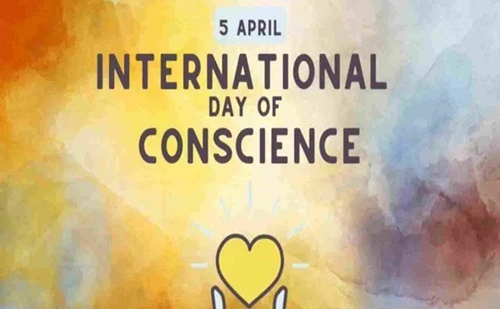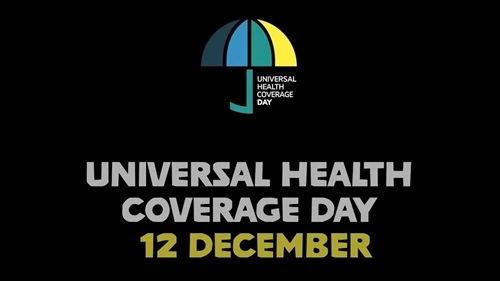The International Day of Conscience, observed annually on April 5, serves as a global reminder of the importance of conscience in fostering peace, harmony, and sustainable development. Proclaimed by the United Nations General Assembly in 2019 through Resolution 73/329, this day emphasizes the role of individual conscience in promoting moral behavior and building a just and compassionate world.
The observance highlights the connection between conscience, ethics, and the universal values of human dignity, equality, and justice. It calls on people to reflect on their actions, make ethical decisions, and work collectively to address global challenges.
The Significance of the International Day of Conscience

1. Fostering Peace and Harmony
Conscience guides individuals to act ethically and resolve conflicts through dialogue and mutual understanding, promoting global peace.
2. Encouraging Responsibility
This day reminds individuals and communities of their moral responsibility to make choices that benefit society and the environment.
3. Addressing Global Challenges
By emphasizing the role of conscience, the day inspires action to tackle pressing issues such as poverty, inequality, climate change, and human rights violations.
4. Strengthening Social Cohesion
A shared commitment to ethical behavior fosters unity and strengthens the bonds between individuals, communities, and nations.
5. Promoting Sustainable Development
Conscience-driven decisions align with the principles of the United Nations Sustainable Development Goals (SDGs), ensuring progress that benefits both people and the planet.
The Origin of the International Day of Conscience
The idea for the International Day of Conscience was initiated by the Federation of World Peace and Love (FOWPAL) and supported by various nations and organizations. Recognizing the transformative power of conscience in addressing global issues, the United Nations General Assembly adopted Resolution 73/329 on July 25, 2019, declaring April 5 as the International Day of Conscience.
The proclamation underscores the UN’s commitment to promoting peace, tolerance, inclusion, and understanding through ethical decision-making and moral awareness.
The Role of Conscience in Society
1. Guiding Moral Behavior
Conscience serves as an internal compass that helps individuals distinguish between right and wrong, guiding actions that align with ethical principles.
2. Resolving Conflicts
By fostering empathy and understanding, conscience encourages individuals and groups to address conflicts peacefully and constructively.
3. Promoting Social Justice
Conscience drives people to advocate for equality, human rights, and the eradication of discrimination and injustice.
4. Encouraging Environmental Stewardship
A conscience-driven approach to sustainability emphasizes the need to protect natural resources and combat climate change for future generations.
Observing the International Day of Conscience
The International Day of Conscience is marked by various activities and initiatives worldwide to promote awareness, reflection, and action:
1. Educational Programs
Schools, universities, and community organizations host workshops and seminars to teach the importance of conscience in personal and societal decision-making.
2. Community Dialogues
Forums and discussions bring people together to address ethical dilemmas and explore solutions to global challenges.
3. Acts of Kindness
Individuals are encouraged to perform acts of kindness and generosity, demonstrating the positive impact of conscience-driven actions.
4. Cultural Events
Art, music, and literature are used to inspire reflection and promote the values of peace, empathy, and moral responsibility.
5. Media Campaigns
Social media platforms and traditional media amplify messages about the importance of conscience, often using hashtags like #ConscienceDay and #ActWithConscience.
The Relevance of Conscience in Modern Times
1. Combatting Inequality
Conscience calls for addressing systemic inequalities and ensuring that marginalized communities have access to opportunities and resources.
2. Promoting Ethical Leadership
In politics, business, and other spheres, conscience-driven leaders prioritize the greater good over personal gain, fostering trust and accountability.
3. Navigating Ethical Dilemmas
As technology and globalization create complex challenges, conscience helps individuals and organizations make decisions that prioritize human dignity and well-being.
4. Building Inclusive Societies
Conscience promotes acceptance and inclusion, encouraging societies to embrace diversity and respect differing perspectives.
How You Can Participate
1. Reflect on Your Actions
Take time to evaluate how your choices align with ethical principles and contribute to the well-being of others.
2. Engage in Dialogue
Participate in discussions about conscience, ethics, and global challenges to gain new perspectives and inspire positive change.
3. Support Ethical Practices
Choose businesses, organizations, and leaders that prioritize social and environmental responsibility.
4. Advocate for Change
Raise awareness about social justice issues and encourage others to act with conscience in their communities.
5. Incorporate Acts of Kindness
Perform small, meaningful actions that demonstrate empathy, compassion, and solidarity with others.
The Role of the United Nations
The United Nations promotes the values of conscience through initiatives that emphasize peace, equality, and sustainable development. Key efforts include:
- Fostering Education: Encouraging education systems to include lessons on ethics, morality, and global citizenship.
- Promoting Dialogue: Facilitating international cooperation to address ethical challenges and conflicts.
- Advocating for Human Rights: Supporting policies and programs that prioritize human dignity and justice.
Looking Ahead
The International Day of Conscience serves as a reminder that individual and collective actions guided by conscience can create a more just, peaceful, and sustainable world. By fostering awareness, encouraging ethical behavior, and promoting inclusivity, we can address global challenges and build stronger, more cohesive communities.
Conclusion
The International Day of Conscience underscores the transformative power of conscience in shaping a better world. It invites individuals, communities, and nations to reflect on their actions, embrace ethical principles, and work together to promote peace, justice, and sustainability.
As we observe this day, let us recognize the value of conscience in our daily lives and commit to making choices that prioritize the well-being of others and the planet. A world guided by conscience is a world of compassion, unity, and hope.

